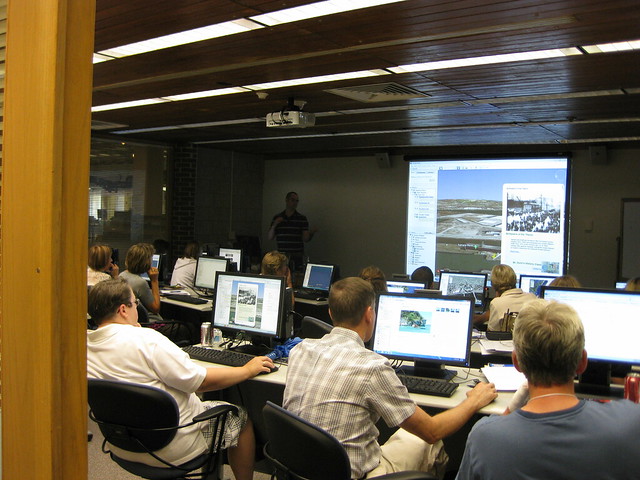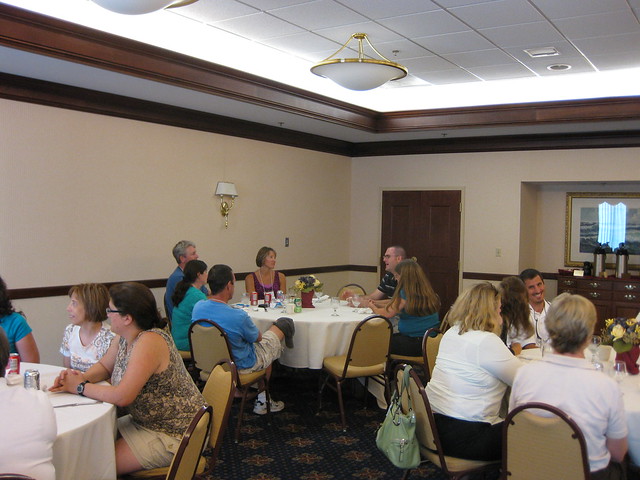Kevin makes some great points in this TED talk, and his talk certainly speaks to the need to teach an understanding of how algorithms work. In my opinion it is important to teach the study of algorithms explicitly, rather than implicitly through just memorizing them. We should focus more on how algorithms are used and why they work. What if kids learned how to create their own algorithms?
Author: David Wees (page 54 of 97)
This is the second in a series of posts on math in the real world.
Which piece of cake should you choose?
This is a problem that often happens at birthday parties. Should you pick a corner piece, a side piece, or one of the middle pieces?
The answer depends on whether you want to optimize for volume of cake, volume of icing, or a balance between enough icing, and enough cake. You can either view this as a volume and surface area problem (or use calculus to determine the optimal piece of cake).
It’s not hard to see that a corner piece has the most available area for icing, but it is less clear whether a middle piece or a side piece has more icing. How much of a difference does the angle in the cake make?
One obvious way to bring this problem (literally) into your classroom is to make a cake and share it with the students, which is more useful if you talk about the shapes of the pieces in advance, and get kids thinking about which piece of cake they should take, depending on their preferences. At the very least it is likely that students will never look at a birthday cake quite the same way again.
This is the first in a series of posts on mathematics in the "real world."
Should you pay to play these games?
Aside from the obvious answer, that these games are fun, and so whether or not you win, the games have an intrinsic "fun" value, one wonders how fair these games are to play. It’s easy to deduce that the games are unfair (why would an organization trying to make money use them otherwise?) but how unfair are they?
This is essentially an expectation problem in the wild, and attempts to analyze games of chance like these by mathematicians led to the formation of probability theory itself.
One way to answer this question is to go to a carnival where there are a bunch of these games, and record some experimental data. You can either use your own money to play all of the games, or stand around surreptitously with a notebook and let other people do the experiment for you, while you record results.
Another way would be to set up your own versions of these games, then host a carnival at your school (or in your classroom), and have participants play the games (perhaps using monopoly money?). If they don’t record results, the activity is fun, but not very mathematical, so I strongly recommend some record keeping takes place during a school sponsored carnival event. You will also need some time at the end for people to analyze, then discuss their results. I recommend, if you do this as a school activity, checking in with your students about common misconceptions about probability that they have, and make sure their analysis of the results spends at least a bit of time debunking some of those misconceptions.
Today, thanks to Aaron Mueller, Dave Zirk, Devin Page, Greg MacCollum, and Skip Via I had a chance to test recording of Google+ Hangouts. I have Camtasia Studio 7, which allows for screen recordings and has the option to record both system audio and the microphone. There are lots of other options out there for recording your screen, many of them free, but I don’t know which of them allows for recording of system sound, which is critical for making this recording work.
Aaron, Dave, and I discussed the Tour de France, and noticed that even in a highly competitive environment like the Tour, people collaborate extensively, at least within their team.
The audio of the recording is fine, except for a few places. The next time I record a Google+ hang out, I’m going to make sure I’m wearing headphones, which should handle the audio issues, which seem to be caused by a slight delay between the microphone being fed by the system speakers, and the system sound itself. However, the small audio glitches aside, Camtasia Studio seems like a highly effective way (if expensive) way to record Google+ hangouts.
If someone knows of a cheaper way to record system audio directly that is as easy to use, I’m all ears. I’d love it if I could find easy ways for students to record Google+ hangouts. I’m not tied to this particular technology itself, but if it works and isn’t too complicated, use it.
(Disclaimer: TechSmith, makers of Camtasia Studio 7, did not pay me for this post. I just like their product.)
Here is a video I created this morning introducing my Reform Symposium presentation on Interactivity and Multimedia in Math.
I’ll be presenting at the free online conference on July 29th, at 9:30am PST. See the complete schedule here.
I just posted this over on Joanne Jacob’s blog in response to some of the comments from her readers.
I recommend reading Keith Devlin’s "The Math Instinct." He makes an interesting argument, which he supports with research, that the math people learn in schools is virtually never used outside of schools, except by a very small percentage of people.
First, he shares research which shows that people have a high rate of accuracy when solving mathematical problems using self-made strategies in such contexts as the supermarket, etc… He then points out that the longer people have been out of school, the MORE successful their strategies are. In other words, remembering the school math strategies for solving problems is a hindrance when trying to solve real life math problems. Further, he points out that only a tiny percentage of people are able to use the school math strategies (which are highly efficient in many ways) to solve problems.
The problem, according to him, is one of an inability to transfer knowledge gained in one domain, and in one style of learning, to another domain in our lives. In other words, knowledge gained about algorithms in schools, regardless of the curriculum used, is too far removed from the actual applications of the math.
So it seems to me that this means that it doesn’t matter if the kids memorize some algorithms as a kid, that this should not be the primary purpose of mathematics education.
Another interesting point to make is that mathematicians, engineers, and other professionals who use mathematics are often not the best at arithmetic, but excel in problem solving and applying math they’ve learned to different contexts. They become a profession that uses mathematics because they are able to use it creatively.
I’m really sick to death of everyone worrying about whether or not kids know how to multiply 6 by 4 and worried that no one seems to be concerned about whether or not kids know WHY we would want to multiply 6 by 4, and HOW this is useful in their actual lives.
If you don’t think that we have a serious problem with numeracy (the ability to think mathematically and apply mathematics to different contexts), see this map of numeracy levels (including ALL adults aged 16 and older, so like all of you who learned mathematics the old way): http://www.ccl-cca.ca/cclflash/numeracy/map_canada_e.html
It paints a pretty scary picture of the problems in numeracy across Canada, in one of the best education systems in the world.
Maybe if we spent a lot more time doing engaging mathematics and applying what the kids learn in context, we might actually have a generation of people who USE mathematics, rather than a generation that complains about how awful math was when they grew up, and how horrible they were at it, but then asks their kids to do the same thing they did.
Some people actually LIKE mathematics, believe it or not.
It’s a bit strong, but so were the comments on her blog.
Chris Wejr ( @MrWejr ) and I polled the #BCed chat channel on Twitter and found out that Monday nights work best for most people. So we are going to try to hold either weekly or biweekly chats about education during the year.
We plan on having our first chat on Monday, July 25th at 7pm. There seem to be enough of us still active on the #BCed Twitter channel during the summer time to make a chat worthwhile. Our first topic, as chosen by people who submitted responses to our survey is: "What should personalized learning look like in our schools?"
Please join us, and if you can invite a colleague who is not on Twitter to join in from the sidelines.
I’m hosting a movie night for An Inconvenient Truth About Waiting for Superman in my apartment complex, in Vancouver, BC. I’ll have space for about 20ish people, and we may share a second education-related movie on the same night (TBA).
Sign up here: http://is.gd/tFCaUV
Date/Time: Friday, July 22nd / 7pm
I’ll send the address of the screening to the people who sign up.
(Update: Link fixed)
Tim Harford has some great points here. I recommend watching his video.
"I will admit that [the process of using trial and error to solve problems] is obvious when schools start teaching children problems which don’t have a correct answer, stop giving them lists of questions, every single one of which has an answer, and there’s an authority figure in the corner behind the teacher’s desk who knows all the answers, and if you can’t find the answers, you must be lazy or stupid…When a politician stands up campaigning for elected office saying, ‘I want to fix our health system, I want to fix our education system, I have no idea how to do it. I have half a dozen ideas, we are going to test them out. They’ll probably all fail, then we’ll test some other ideas out, and we’ll find some that work, we’ll build on those, and we’ll get rid of the ones that don’t." ~ Tim Harford
Imagine we used an iterative process to solve the our problems in education. Our current system assumes that there are people who know the best solution already, and that all we need to do is implement it everywhere. Obviously this isn’t true. Our education system is far to complex to be something that any one person can know how to solve, no matter how smart they are.
Imagine we had a public policy that was designed to promote innovation in education. Imagine people were expected to experiment more, and share their results. Imagine we had the mindset that no one could solve the problems in education alone, and that no single theory is the best theory. Imagine we found actual solutions to the education system, even if we didn’t complete understand the solutions, rather than changing policy on 4 or 8 year election cycles with little positive effect on the system.
That would be refreshing.


Image credit: uconnlibrariesmagic
If you are running a professional development session for teachers, and you recognize that teachers are learners, how are you assessing their learning? Are you embedding formative assessment within your workshop? Are you providing an option for summative assessment of the learning, either at the end of the workshop, or in a follow-up session?
While I don’t think you should be giving grades to teachers for workshops, you do need to provide some way for your participants to receive feedback on what they’ve learned. Feedback in some form while learning is critical. Otherwise, how do you know your participants are learning anything?